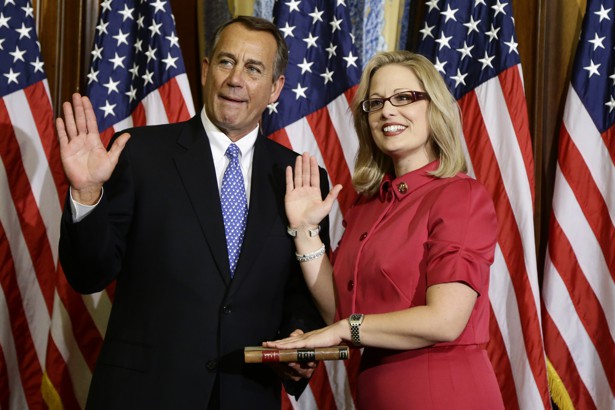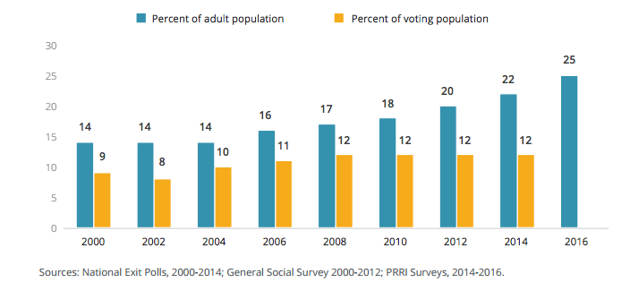The 115th Congress is back in session, and at least one thing looks the same as usual: 91 percent of its members identify as Christians. This proportion has basically remained constant for more than five decades, as long as this kind of data has been available, according to a new study from Pew Research Center. What has changed is the U.S. population: Only 71 percent of American adults identify as Christians.
Some religious minorities, including Muslims, Hindus, and Buddhists, are slightly underrepresented in Congress relative to their population sizes in the United States, while others, including Jews and Mormons, are slightly overrepresented. But these groups aren’t the source of the demographic mismatch between Congress and the rest of the country. The Americans who are vastly underrepresented in Congress are those who don’t identify with any religion at all: Only one member of Congress, Kyrsten Sinema of Arizona, says she is religiously unaffiliated, while 10 others declined to state their affiliation in surveys and interviews with CQ Roll Call.
There are at least two good explanations for this phenomenon. The first is that religiously unaffiliated Americans don’t vote. Another way of putting that is that young people don’t vote: According to the Public Religion Research Institute, 18-to-29-year-olds are three times as likely to be religiously unaffiliated compared to people over 65. Even though the religiously unaffiliated share of the American population has significantly increased from 14 to 22 percent between 2004 and 2014, the share of religiously unaffiliated voters only increased from 9 to 12 percent. This chart offers a stark illustration of how politically disengaged these voters really are:
Religiously Unaffiliated Americans Don’t Vote
Scholars and journalists have long decried the civic apathy of the young. But at least in terms of religious demographics, it makes sense that there has not been a political revolution under the banner of irreligion: “Religiously unaffiliated” is a category popularized by pollsters. It is a useful demographic tool, but not a very useful way of understanding how these Americans think about politics.
“Religiously unaffiliated” means these Americans don’t feel like they’re part of any particular religious tradition or denomination. But that includes a huge and diverse group of people. Those who formally identify as atheists and agnostics are actually a minority, representing roughly 3 and 4 percent of the American population, respectively. Others in this group, which includes roughly 23 percent of Americans, might be in the process of changing religions or feel like they have no spiritual home in a formal house of worship. They include people who believe in God and people who might be married to a spouse with a different faith background. And they include lots of people who don’t find religion particularly important or relevant in their lives.
This, above all, is why it’s suspect to suggest that religiously unaffiliated people are underrepresented in Congress: They are not actually a coherent demographic group. It makes some sense that people who have mixed feelings or don’t care about religion wouldn’t bother organizing to get more of their kind in Congress. It’s also possible that at least some of the members who claimed a specific faith on their CQ Roll Call survey are only nominally religious, anyways. After all, any pollster worth his galleons knows it’s tough to elect atheists to political office.
If this is truly a crisis of representation, there’s good news. Religiously unaffiliated Americans who are bothered by their lack of a voice in Congress can use one simple trick to start making change: They can vote.
Original Article
Source: theatlantic.com/
Author: Emma Green
Some religious minorities, including Muslims, Hindus, and Buddhists, are slightly underrepresented in Congress relative to their population sizes in the United States, while others, including Jews and Mormons, are slightly overrepresented. But these groups aren’t the source of the demographic mismatch between Congress and the rest of the country. The Americans who are vastly underrepresented in Congress are those who don’t identify with any religion at all: Only one member of Congress, Kyrsten Sinema of Arizona, says she is religiously unaffiliated, while 10 others declined to state their affiliation in surveys and interviews with CQ Roll Call.
There are at least two good explanations for this phenomenon. The first is that religiously unaffiliated Americans don’t vote. Another way of putting that is that young people don’t vote: According to the Public Religion Research Institute, 18-to-29-year-olds are three times as likely to be religiously unaffiliated compared to people over 65. Even though the religiously unaffiliated share of the American population has significantly increased from 14 to 22 percent between 2004 and 2014, the share of religiously unaffiliated voters only increased from 9 to 12 percent. This chart offers a stark illustration of how politically disengaged these voters really are:
Religiously Unaffiliated Americans Don’t Vote
Scholars and journalists have long decried the civic apathy of the young. But at least in terms of religious demographics, it makes sense that there has not been a political revolution under the banner of irreligion: “Religiously unaffiliated” is a category popularized by pollsters. It is a useful demographic tool, but not a very useful way of understanding how these Americans think about politics.
“Religiously unaffiliated” means these Americans don’t feel like they’re part of any particular religious tradition or denomination. But that includes a huge and diverse group of people. Those who formally identify as atheists and agnostics are actually a minority, representing roughly 3 and 4 percent of the American population, respectively. Others in this group, which includes roughly 23 percent of Americans, might be in the process of changing religions or feel like they have no spiritual home in a formal house of worship. They include people who believe in God and people who might be married to a spouse with a different faith background. And they include lots of people who don’t find religion particularly important or relevant in their lives.
This, above all, is why it’s suspect to suggest that religiously unaffiliated people are underrepresented in Congress: They are not actually a coherent demographic group. It makes some sense that people who have mixed feelings or don’t care about religion wouldn’t bother organizing to get more of their kind in Congress. It’s also possible that at least some of the members who claimed a specific faith on their CQ Roll Call survey are only nominally religious, anyways. After all, any pollster worth his galleons knows it’s tough to elect atheists to political office.
If this is truly a crisis of representation, there’s good news. Religiously unaffiliated Americans who are bothered by their lack of a voice in Congress can use one simple trick to start making change: They can vote.
Original Article
Source: theatlantic.com/
Author: Emma Green


No comments:
Post a Comment